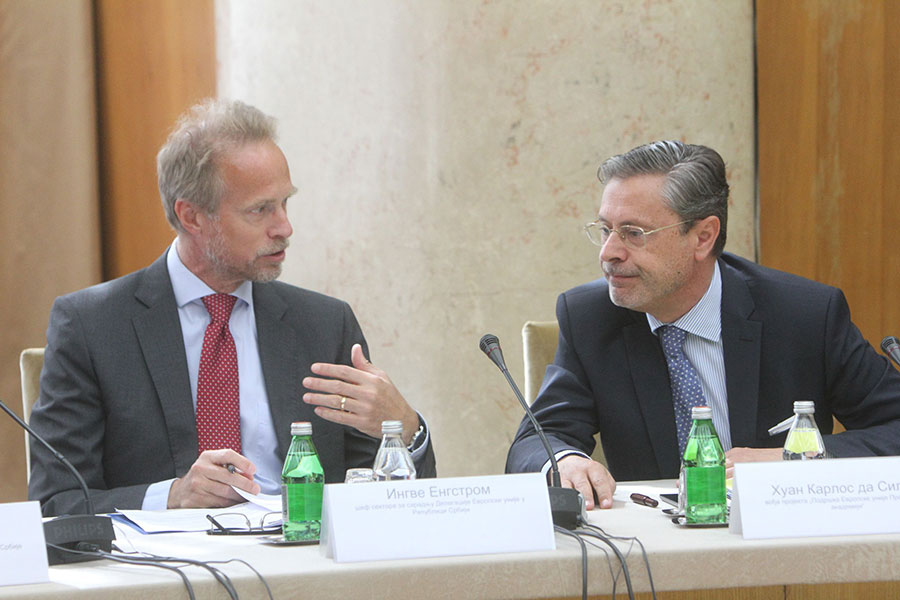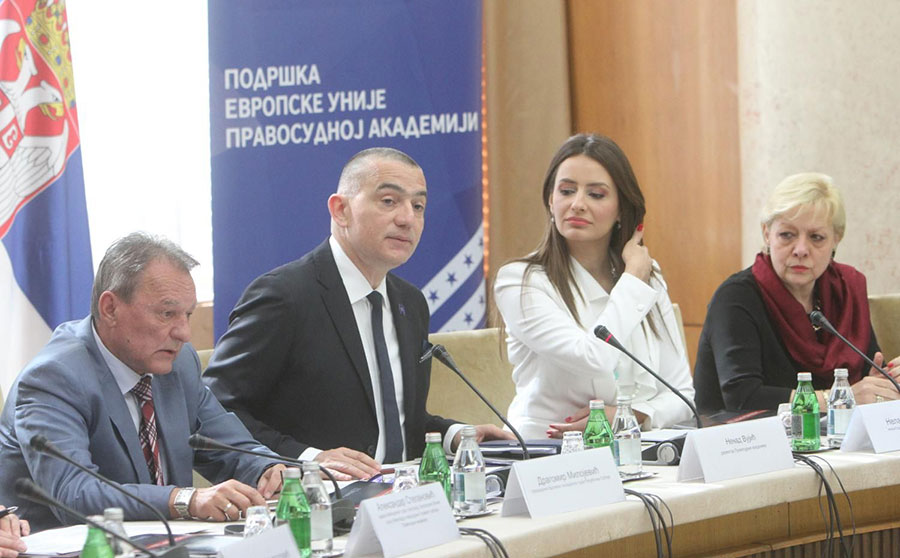The Judicial Academy presented its 2017 Annual Report at the Palace of Serbia. A number of the activities listed and results achieved have been achieved in strict cooperation established with the IPA 2013 project “Enhancing Educational Activities and Improvement of Organisational Capacities of the Judicial Academy”.
On this occasion, Nela Kuburović Minister of Justice of the Republic of Serbia, emphasized the importance of the work of the Judicial Academy: “only if we have quality trained judges, we can speak of an independent, responsible judiciary and the judiciary we aspire to”. She also reminded that “The proposal of the constitutional amendments “sent to Venice Commission stipulates that candidates first elected to courts and public prosecutors must undergo proper training in an institution that is responsible for that,” and that through capacity building the Judicial Academy should be the right point of entry to the judicial office.
Nenad Vujić, director of the Judicial Academy, underlined in his introductory speech, how “the National Judicial Reform Strategy marks the Judicial Academy as one of the key actors in the reform process”
Dragomir Milojević, Chief of Justice/President of the Supreme Court of Cassation has highlighted that “The involvement of judges of the Supreme Court of Cassation in the work of the Judicial Academy is significant. Approximately 75% of the judges of this court participate in its functioning, either as members of the Management Board or the Program Council, either as lecturers or members of examiners. And this practice will continue in the future”.
Jasmina Kiurski, deputy of the Republic Public Prosecutor of the Republic of Serbia, stated in her presentation how the Republic Public Prosecutor’s Office supports the development of the capacity of the Judicial Academy, especially in the field of professional development of public prosecutors and deputy public prosecutors, which is important for the efficient and quality performance of the public prosecutor’s office. She added the Prosecution “welcomes the implementation of the project “European Union Support to the Judicial Academy” and emphasized this successful cooperation.
 In his address, Ingve Engstrom, Head of Cooperation of the European Union Delegation, stated: “It is my pleasure to see the institution that the EU has been supporting for years, to appear before the legal community and public opinion in order to present its achievements. Our annual Progress Report for Serbia for 2018 was published last week and it emphasized the need to improve the capacities and professionalism of the Judicial Academy. The EU stands behind it to support efforts in this area, realizing that some time and expertise is needed for the final consolidation of training in the judiciary in Serbia”.
In his address, Ingve Engstrom, Head of Cooperation of the European Union Delegation, stated: “It is my pleasure to see the institution that the EU has been supporting for years, to appear before the legal community and public opinion in order to present its achievements. Our annual Progress Report for Serbia for 2018 was published last week and it emphasized the need to improve the capacities and professionalism of the Judicial Academy. The EU stands behind it to support efforts in this area, realizing that some time and expertise is needed for the final consolidation of training in the judiciary in Serbia”.
This technical assistance aims at the improvement of the independence and efficiency of the judiciary through enhancing educational capacities of the Judicial Academy and establishment of the consistent judicial system of the Republic of Serbia. Through this cooperation, lot of efforts focused on relevant areas such as professional assessment of trainings needs, standardisation of curricula, improvement of electronic management tools, standardisation of procedures, establishment a professional network of 28 judges and prosecutors specialized on jurisprudence of European Court of Human Right, better training of trainers for in-service education, improved quality and evaluation mechanisms etc
The challenge facing the JA now is to use these tools in its daily operation and to ensure through them a level of capacity in the judiciary up to the needs and expectations of the international community and the Serbian society.




